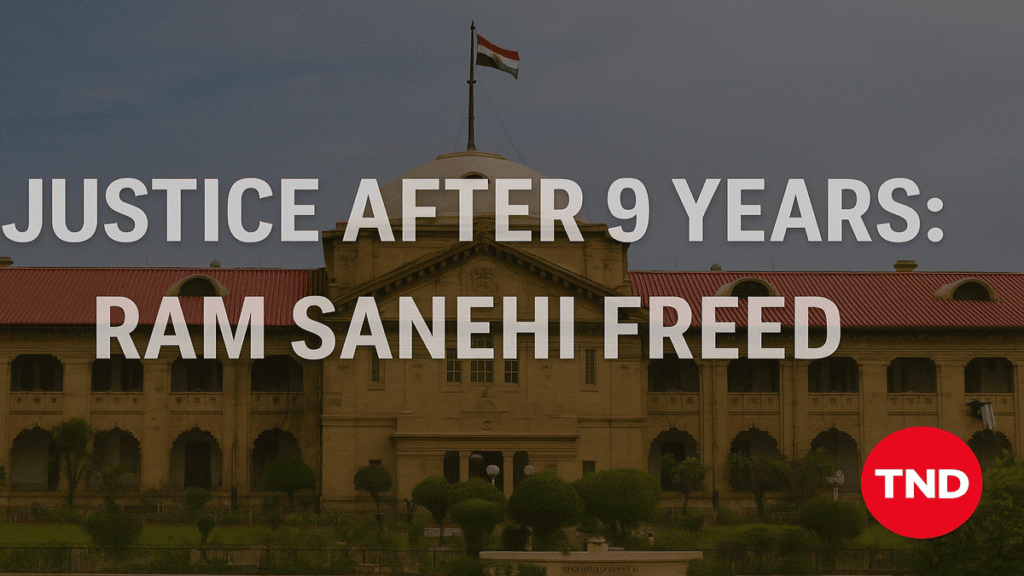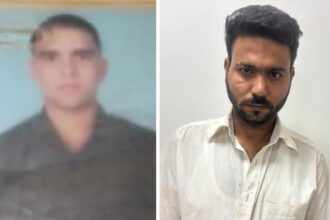
Lucknow/Hardoi, July 16 (TND) – In a powerful judgment that has reignited conversations around misuse of stringent laws like the POCSO Act, the Allahabad High Court, led by Justice Subhash Vidyarthi, has acquitted Ram Sanehi, a man from Hardoi district who spent nine long years in prison for a crime he never committed.
The Ram Sanehi case is a heartbreaking example of how vulnerable individuals, with no legal or financial support, can fall prey to a broken justice system. The court’s verdict has not only restored a man’s lost dignity but also exposed the systemic flaws in the police investigation, prosecution, and lower court judgment.
The Origin of the Ram Sanehi Case
The Ram Sanehi case began from an almost unbelievable trigger a saree that reportedly fell from the neighboring house into his property. As per reports, Ram Sanehi, who had no immediate family or legal guardian, burned the saree. What followed next was nothing short of a nightmare.
The relatives who lived next door the owners of the saree allegedly fabricated a POCSO case against him. They accused Ram Sanehi of kidnapping and raping their minor daughter.
Despite glaring gaps in the prosecution’s story and no one to represent him properly, Ram Sanehi was swiftly convicted by the trial court, which sentenced him to 20 years of rigorous imprisonment under the Protection of Children from Sexual Offences (POCSO) Act.
Evidence Ignored by Lower Court
During the original trial, the medical examination of the alleged victim yielded no injuries, no evidence of recent sexual activity, and no semen traces facts that typically weaken any case of alleged rape.
Additionally, the statements of the girl and her parents were contradictory, making the prosecution’s version highly unreliable.
Still, these inconsistencies were overlooked by the lower court, leading to a wrongful conviction that kept Ram Sanehi behind bars for almost a decade.
High Court’s Intervention Brings Justice
With no lawyer of his own, Ram Sanehi filed an appeal on his own behalf. The High Court then appointed an Amicus Curiae to assist with the matter. However, the appointed lawyer allegedly showed little interest in securing justice, aiming only to reduce the sentence and receive his professional fee.
It was only due to the diligence of Justice Subhash Vidyarthi that the full facts of the Ram Sanehi case were brought to light.
Justice Vidyarthi painstakingly reviewed the entire case history, highlighting the lack of evidence, flawed investigation, and the unjustified conviction handed down by the trial court. In a scathing critique, he remarked that there was absolutely nothing on record that could have proven Ram Sanehi’s guilt.
Misuse of POCSO Act Highlighted
The Ram Sanehi case has once again highlighted the rampant misuse of the POCSO Act a law meant to protect children from sexual offences but increasingly being used to settle personal scores or make false allegations.
Justice Vidyarthi’s judgment clearly emphasized the need for cautious application of such stringent laws, especially when they have the power to ruin innocent lives.
He also directed the Superintendent of Police, Hardoi, to ensure that Ram Sanehi’s house is returned to him, as it may have been occupied by the very people who falsely framed him.
Systemic Failure
The Ram Sanehi case represents more than just a personal tragedy. It reveals multiple layers of systemic failure from a botched police investigation, prosecutorial apathy, to a lack of critical scrutiny by the trial court.
The absence of legal aid and state appointed defense lawyers who actually work in favor of justice is another glaring issue. Had Justice Vidyarthi not taken the time to look beyond the surface, Ram Sanehi might have spent his entire life in prison.
Public Reaction and Judicial Integrity
The verdict has gone viral on social media, with citizens and activists hailing Justice Subhash Vidyarthi as a symbol of hope and judicial integrity. Many have called for an overhaul in the legal aid system, demanding that the state must ensure quality legal representation for the poor.
The Ram Sanehi case is a reminder that while justice may be delayed, it must not be denied. More importantly, it brings focus to the urgent need for judicial accountability, police reform, and checks against misuse of criminal laws.
What Lies Ahead for Ram Sanehi?
After nine years of wrongful incarceration, Ram Sanehi walks free, but with nothing no family, no property, and no compensation. While the court has ordered his house be returned, questions remain about his mental health, livelihood, and reintegration into society.
Civil society groups and legal activists are now calling on the Uttar Pradesh government to grant him compensation and rehabilitation under the Victim Compensation Scheme, which in many cases also covers victims of wrongful conviction.
Conclusion
The Ram Sanehi case stands as one of the most mind boggling failures of the Indian justice system. It also shines light on the power of a single judge’s conscience to undo years of injustice. Let this be a wake up call for reforms across the board, from policing to prosecution to public defense, so that no other Ram Sanehi suffers again.
Stay Connected with The News Drill for more updates. Stay informed. Stay updated. Stay Ahead.
Send tips or injustice stories: editor@thenewsdrill.com
Contact The News Drill: contact@thenewsdrill.com
















